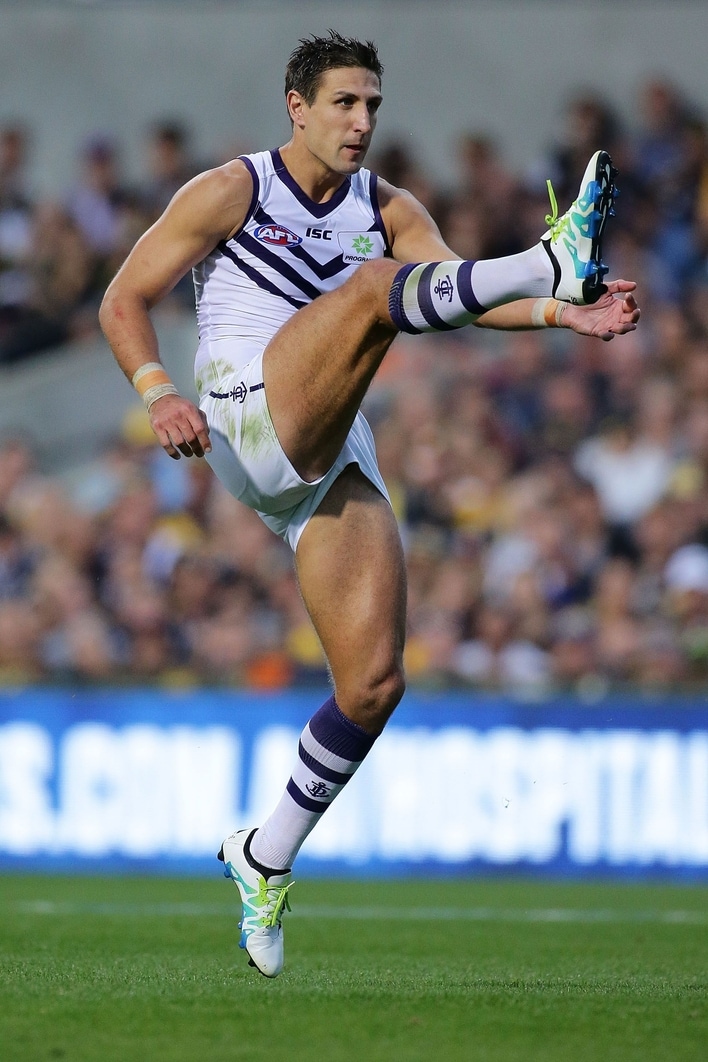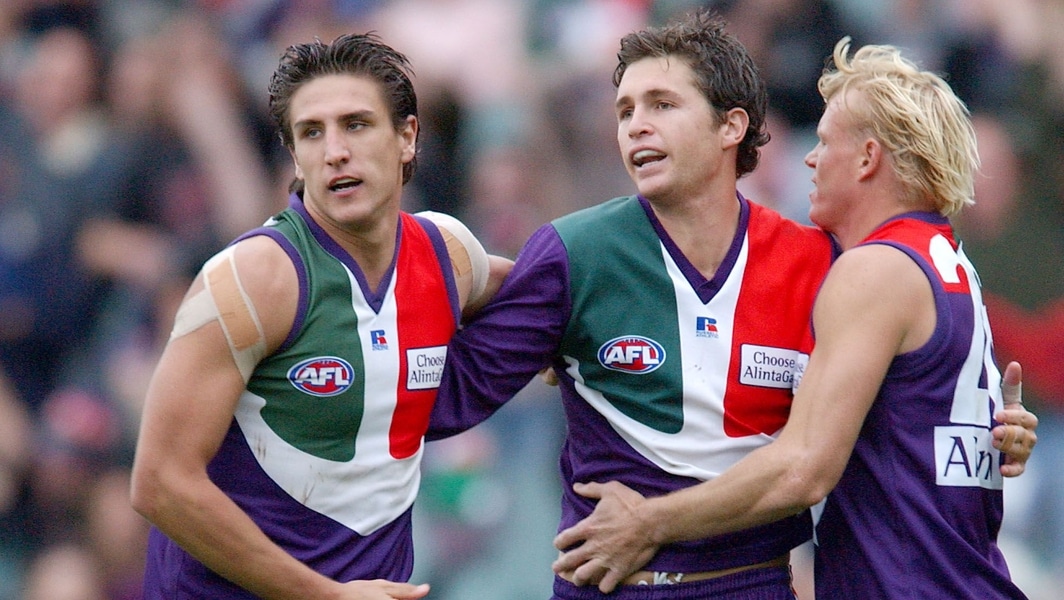There are sliding doors moments in everyone's life and Matthew Pavlich occasionally harks back to one of his.
Had Pavlich signed a two-year deal with Fremantle when drafted at the end of 1999, he would still be about to enter the Australian Football Hall of Fame – but it would have been wearing the silver and teal, black and white of Port Adelaide.
He was a superstar. The 10,000-hour rule, as floated by Swedish psychology professor Anders Ericsson and widely promoted by writer Malcolm Gladwell, has never been properly tested when it comes to Australian Football, but Pavlich might be a case study.
He grew up in Adelaide surrounded by the game and completely obsessed by it.
His father Steve and his uncle Mark both played for the old West Torrens in the SANFL.
As a junior, Pavlich displayed all the traits to suggest he would become a very good AFL footballer. He ended up much more than that.
"It was never forced, it was just there as an ever present," he said.
"Dad was the coach of the Woodville-West Torrens under-17s, so we'd wake up on a Saturday morning, I'd play my junior footy, go watch my sister play netball and then we'd go to the senior game, so I was given access to a senior environment that nobody else would have at that age.
"I have this visceral memory of the sounds, the smells, the language (good and bad) and the stories and the actions. So I played it and lived it and that helped get me ready."

Irrespective of where he played his AFL footy, a stellar career beckoned. And so it proved it to be.
Because his first contract was for three years, not the two that was usually the standard for drafted players, he never returned home to play in South Australia when Port Adelaide came hard early on.
He remained at Fremantle, is so glad he did so, and becomes the first Hall of Fame inductee to play his entire career for the club.
Pavlich's career took off in 2002 when, after Chris Connolly's first season as coach, he blossomed as a key defender and won the first of his six All-Australian blazers.
It was plain the club was building something after the disappointment of a two-win season in 2001.
He loved the year or so he spent as a defender.
In a way it completed his football education, having played primarily up forward as a junior. Before much longer, he would return there and that's where he achieved greatness.

Under Connolly and at the direction of fitness coach Adam Larcom, Pavlich thrived.
"They had a different philosophy around using the bench and physical training," he said.
"It was all about speed and endurance and Olympic lifting and that certainly suited my body type – sprint effort and repeat efforts rather than longer aerobic sessions and that allowed me to play in different positions."
Pavlich was a physical freak. He played a minimum of 18 games a year in every season over his career, except for 2013 when an Achilles injury restricted him to 12.
Of the 353 games he played for the Dockers, 155 were outside Western Australia. Nearly every second game he played came after flying to the other side of the country.
"I had a decent amount of luck," he said.
"I had 12 surgeries, but nothing that interrupted a whole year.
"I had a real dedication to the game and to my body. Jumping into the beach when nobody wanted to, extra yoga sessions when nobody wanted to, dotting every 'i' and crossing every 't' when it came to ice baths and physio.
"It was using all of those at my disposal to get the most out of my body."

The beauty of making the Hall of Fame is that those about to be inducted feel less shy about talking up their strengths and Pavlich only needed a little prompt to talk about where his assets lay on the field.
"Ability to read the play, explosive and repeat efforts," he said when asked to self-scout.
"If I was playing on a tall or cumbersome opponent, I was able to take them up to a stoppage and get them lost there, and on a smaller player, I could isolate them deep. That kind of variety was really important.
"At my peak I was able to run players into the ground and get them later in games, having the ability to kick the ball from a long way out and be pretty crafty close to goals. That's where my strengths lay."
Pavlich's trophy cabinet is stacked with individual honours. Six club best and fairests, eight times leading goalkicker and, in 2012, the Coleman Medal. All that is missing is a premiership medal.
Fremantle lost the Grand Final to Hawthorn in 2013. It doesn't consume him, but as he said, "throughout the year the mind wanders and at random points you do think about it. (We kicked) 8.14 and five on the full and we lost by 15 points."

That game came three weeks after his career highlight, beating Geelong in the qualifying final at GMHBA Stadium, the first and only final in Victoria under the AFL banner not played at the MCG, Marvel Stadium or the old Waverley Park.
"That galvanised us," Pavlich said.
"We felt we got the raw end of the stick and we kind of shoved it up the AFL who advocated having the game and perhaps even Geelong itself."
The one that got away might have been in 2015 when the Dockers lost a home preliminary final to Hawthorn. "The only time I ever cried after a game of footy," he said. "We probably knew that deep down, that team was at an end. We were pretty much done."
Ross Lyon coached that group and is rated by Pavlich as the best coach he played under.
"He could make all the complex stats, systems and structures very easy to understand and made his players give their greatest effort," he said.
"He empowered his leaders. He would challenge me, but allowed me to grow and be the best player I could be."

Football has been great to Pavlich. His approach to playing might have bordered on anal, but he explored boundaries off the field and used the opportunities afforded by the game to network extensively.
He has developed extensive business interests in Western Australia (sorry South Australia, he's never coming back) and appears regularly on Channel Nine and Fox Footy.
He also served as president of the AFL Players Association, no easy feat while playing and living in Perth in a time before Zoom.
And as he prepares to join the Hall of Fame, those who helped him along the way are foremost in his mind.
"It does allow me to think of the great people who have supported me, family and friends, but also the great people you meet along the way, the players and the coaches, the people from my junior days," he said.
"It's a reflection on them as much as it is me. But it is humbling and I'm still pinching myself."


